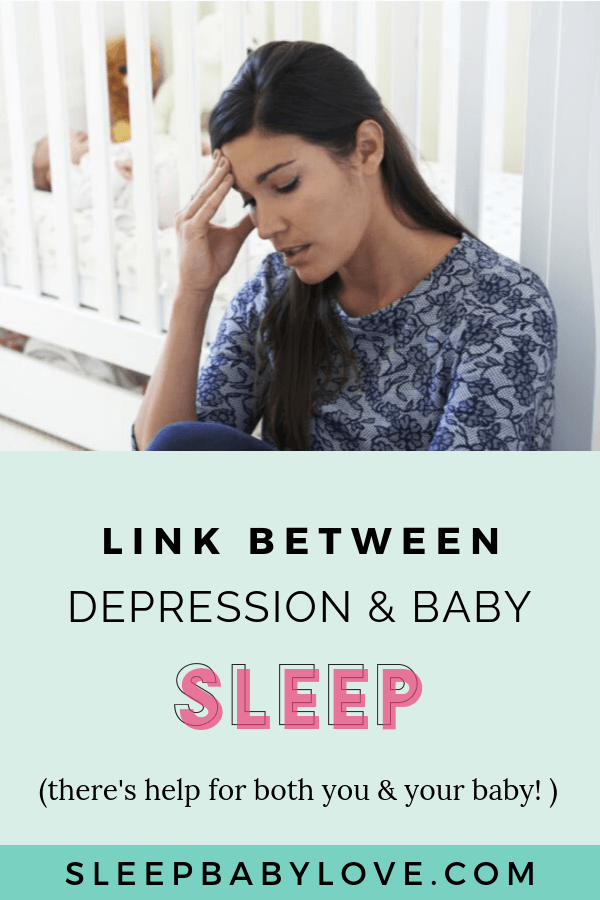The Hidden Link Between Moms Feeling Down And Baby Not Sleeping
Having a baby is a roller-coaster time, even for those who have already parented, and feel very prepared. Every baby is different: each has different skills and challenges, and the context in which a parent needs to raise them can make for a very different experience between children.
If you’ve ever experienced depression or you are experiencing it now, you might wonder how it affects your children, especially if you have a baby. Your bond with your baby is such a close, strong bond, they can’t really be unaffected by it, but did you know it can change their sleeping habits?
(Hey everyone, Susie here. My friend Nora wrote this post. The stigma of mom blues is so essential to draw light to the subject (to get the help that parents deserve).
1) During Pregnancy
Surprisingly, depression during pregnancy can affect your child’s sleeping after they are born, and can do so for some months. Some experts suggest even up to thirty months, so your baby may still be struggling to sleep well at two-and-a-half years old as a result of depression during your pregnancy.
Recent research into this is encouraging more focus on making sure women who suffer from depression during their pregnancy are looked after and get the help they need. There’s no evidence to suggest that taking antidepressants during pregnancy can hurt the baby, but make sure you talk to your doctor and discuss the best options for you if you’re concerned. If you’re already taking antidepressants and you’re trying to get pregnant, it’s also important to talk to your doctor.
2) After Pregnancy
Many women suffer from low moods once they’ve given birth, and depression can often be confused with baby blues. It’s essential that if this is the case, you get in touch with your doctor and ask them about your options. Don’t go without help at a time when you need emotional stability to properly bond with your child.
A mother who is suffering from depression will struggle to cope with and respond to their child’s needs. They may be very loving at one moment, and suddenly distant the next. This will make the child insecure and mean they struggle to relate to their mother, and may cause problems later in life.
“An unsettled child is likely to sleep badly, wake up often, and need attention during the night. This can be very wearing for both parents, and is likely to worsen the mother’s mood and energy levels, and consequently her ability to provide for her child” says Rose Lindsey, a psychology writer at Academized and Australian help.
3) What Can You Do?
There are many things you can and should do if you’re worried about your child’s – and your own – health and sleep. Poor sleep in infancy can cause significant problems with sleep throughout your child’s life, so don’t underestimate the importance of addressing these issues.
As well as getting medical attention and ensuring you receive proper treatment and support, creating an optimal sleeping environment can make a world of difference. The more regular your child’s sleeping schedule, the more quickly and easily they will fall asleep, and the better they will sleep.
Focus on creating a sleep schedule (and yes, it can be flexible) to set a time that you put your child to bed, and do your best to stick with this time. Everyone knows the chaos and learning curve of new motherhood makes this problematic, but do your best.
“It’s also important to establish a nap for your baby, especially when they’re small. Newborns will sleep very often, but as they get a little bigger, try and find a time which stops them from getting too tired and grumpy, and also allows plenty of time for them to get sleepy again at night” comments Randy Smith, a health writer at State of writing and Paper Fellows.
Interestingly, making an effort to change your child into pajamas to sleep is a cue they will pick up on and respond to very quickly, so do this as part of the routine. Set other signals which they can respond to, such as music, soft lighting, etc. A baby’s sleeping routine ought to regulate itself by about four months old.
Most importantly, when it comes to sleep, teaching your baby independent skills is such an important part of the big picture. Check out this sleep training ultimate guide as a first step to help understand the process.
Conclusion
New parents have so many challenges to face, but shouldn’t underestimate the importance of good, consistent sleep routines that their child can depend upon. Establishing circadian rhythms early on in life may save your child from sleep problems later, which, in today’s increasingly insomniac world, may become one of the greatest gifts you can give them. It will also ensure that you and your partner get better rest and are therefore able to be better parents yourselves.
Nora Mork is a lifestyle and health journalist at UK Writings and Essay Roo. She loves reading, hiking with her family, and sharing stories at blogs, such as Boom Essays.

